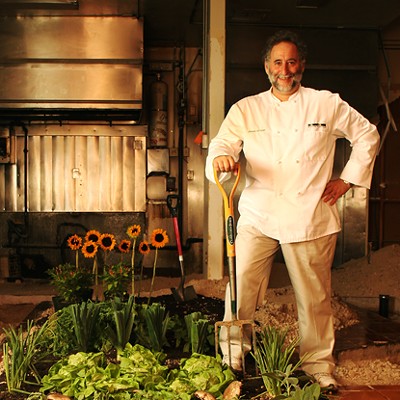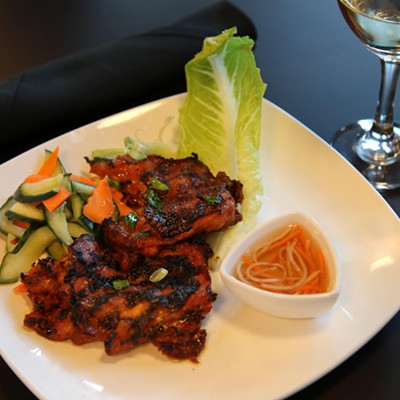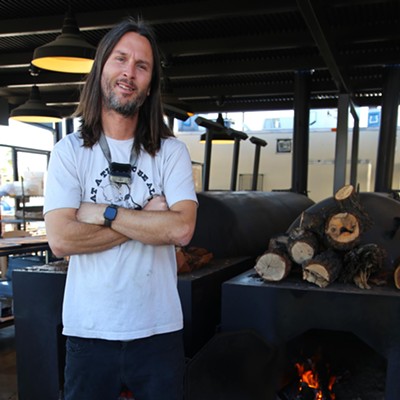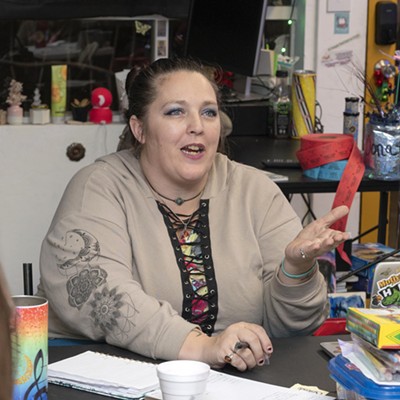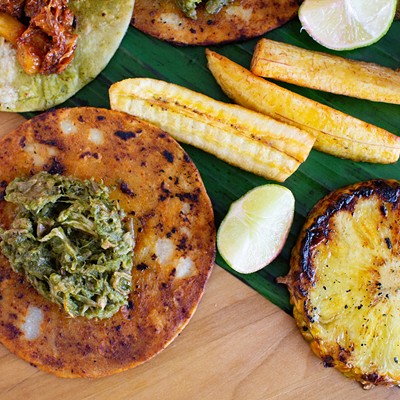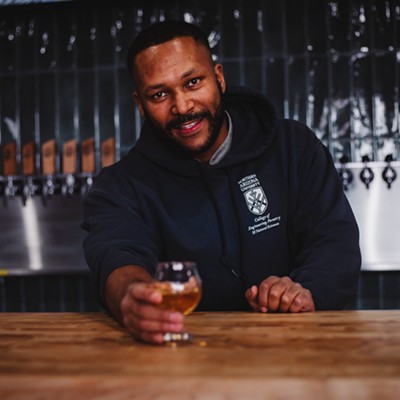I recently sat down with Janos Wilder, owner and chef of Downtown Kitchen + Cocktails, to talk about the May closing of his longtime restaurants Janos and J Bar. We also discussed what the future might hold.
Wilder originally opened Janos restaurant downtown in the Stevens House at the Tucson Museum of Art in 1983, before moving the restaurant to the grounds of the Westin La Paloma resort in 1998; he added J Bar to the same building in 1999. Janos came back downtown, opening Downtown Kitchen + Cocktails, in October 2010.
Wilder was the recipient of the James Beard Award for the Southwest region in 2000.
Full disclosure: I worked as a chef at Janos from 2002 to 2005.
It's been 29 years since you opened at the Tucson Museum of Art. What have you learned? How did it change you?
I'm not sure how it fundamentally changed me. It probably physically aged me in different ways—so many years on your feet. I'm not sure that it fundamentally changed me in many ways. I'm still very curious; I'm still really passionate about what I do. I haven't lost my love for food one bit; if anything, it's broadened.
Clearly, I've learned a lot about being a business person and running restaurants that I didn't know. I was 28 when I started; I had never been in business at all, and so I've learned an awful lot about that. It's been good lessons, well learned. I've learned a lot about (customer service), and that perspective might have changed a little bit, because I come from a chef's perspective, and while that is still very much my focus in many ways, customer service is as important or more important than the chef's perspective, purely about food. That was something I learned as I came out of the kitchen more and interacted more with my guests—I began to embrace it and love it. It's really a lot of fun; it's the backbone of what you do.
I've learned a lot about running a business and working with a staff, and a lot about what works and what doesn't, and how important the input from your staff is—bringing things from the bottom and how important the inclusion of your staff is in important decisions in the restaurant, particularly in the front of the house, when we talk about staffing issues. (And) really bringing the kitchen along to understand the food that we're doing to the point where they can not only embrace it, but contribute to it. Those pieces were learned. You start; you have all the answers; and then you realize you don't have all the answers, but the answers are right in front of you.
Any regrets?
Not in a big way. When we left downtown originally, I wasn't looking to move; it was a move that we were forced into by our landlord, but it's one that I came to fully embrace. Also, it's one that, when we left the Stevens House, we had drunk from that cup fully. (We had) fully realized everything we possibly could there, and I didn't have any regrets in that I wish I would have done this, or missed out on that opportunity, or didn't explore this fully. We really did that very, very thoroughly, so I felt totally comfortable and at home with that.
Really, similarly, at the Westin, it was our decision. It was time, and I felt that we had expressed what we wanted to express, particularly in the fine-dining end, really fully and really completely, and had a tremendous ride for almost 30 years. It was time. Letting go wasn't difficult to do. There were no regrets in that regard. I feel really thankful and appreciative that we were able to make our own decisions there. Closing was our decision; it wasn't forced upon us, and it was something we really considered and took our time considering and felt was the best for us—best for the business, best for the staff—and would allow us to create new opportunities.
The closing of Janos has impacted fine dining in Tucson. What do you think the future of it is?
I think that really, Tucson impacted fine dining; the economy impacted fine dining; and fine dining is by no means dead or over—it's just changed. When you say we impacted fine dining, well, yes, I suppose we did, because I hope that we were at the pinnacle of that. You would hate to close and have your customers and guests not miss you. That would be horrible. So, I very much appreciate and am grateful for that, but fine dining is changing. I don't think quality dining is changing, I don't think people's desire for wonderful, creative food is changing—that may even be expanding—but it's taking place in a less-rarified, less-quiet, less-closeted environment.
Not that there aren't people who still want that (rarified, quiet experience), and not that it was ever a bad thing—I loved it; it's really special to be taken care of and pampered in that way—but modern sensibility appreciates more the excellence of cuisine without the pomp and circumstance, without the ceremony. It's not even a price thing necessarily. The long, 2 1/2-to-3-hour meals, while not dead, are just not popular. There's not the demand for it, at least not here in Tucson—and I think everywhere, really. That's changed a lot; I don't think we changed it. I think that changed, and we reacted.
What was the last staff meal at Janos?
That's a great question. I don't have the answer. I don't even remember eating that day. I didn't eat at my wedding, either, though. We all got together, and we toasted with champagne before service. It was an emotional time for all of us, and I remember that, but I don't remember. It was probably really good, I'm sure. Certainly there wasn't anything to hold back.
What were you drinking afterward?
Nothing. It's not the way I relax. The champagne toast was important; to me, the words were much more important, the thoughts and memories. One of the things that became really important to me and that I really wanted to emphasize with the staff—it was a crazy night, as you can imagine—at our pre-meal, was for them to take a moment to appreciate where they were and what was going on around them, and what they were a part of, because they'd never get it again. I didn't want that to be lost in the noise of the evening—for me, either. You'd look at people during the night and catch their eye. It was a profound time.
Your favorite menu item from 30 years of food?
I guess several—well, you said favorite. The lamb four ways from the heart of Mexico. That one, it really in a broad way, expressed a complete articulation of culinary ideas from Mexico and from our use of native products, and the marriage of those sorts of ingredients and those flavor profiles with French technique. That could have been a sort of a paragraph that described what we do really well, and it tasted so good. Every flavor in there was great.
The lamb-tongue taco was always one of my favorites.
In itself, that's the bomb. We serve that one here. It's on the bar menu.
How about one that didn't work?
I don't remember those. Well, I remember back in the day, maybe in '85, I put skate wings on the menu, and I didn't do it again. I'm sure there were others, but that one really stands out.
Speaking as a chef with more than 30 years of experience, what is something you think everybody should know how to make?
A mess! And know how to clean it up. (Laughs.) No ... what should they know how to make? They should know how to cook with fresh ingredients. That's what they should know how to do—how to stay out of the way when it's important, and know how to elevate the ingredients when that's important. That's our job, to know how to coax all of the potential out of an ingredient. Sometimes that means stay out of its way; sometimes that means to do something like this (he gestures to a fried calamari appetizer that I bought), which is so much more than the individual parts of it. So, that's what you want to know how to do.
Talking about fresh ingredients: Janos was a big driver in pushing local foods and the locavore movement. Are you planning to continue those efforts with Downtown Kitchen + Cocktails?
I sure do. I just was out this afternoon, picking up golden watermelons from the San Xavier Co-op. We just pulled out all of our summer gardens and are replanting our fall and winter gardens. That's just part of ethos; it's so cool to see that it has gained traction and has become part of the overall ethos of restaurants and home cooking. It's so different than it was when we started. I was talking to (a colleague) about this when I took him out to the farm this afternoon, about how much things have changed.
When we first opened, our gardeners had no other outlets for the food. They could sell a little bit at the Food Conspiracy, but no other restaurants had any idea what to do with it. They could give it to their friends, which they always had done. ... And so, having Francine Pierce at Harlekin Gardens (in Arivaca) very, very early on, and trying to work with her to find other outlets for the produce, it was hard. It was long before (community-supported agriculture efforts) made their entrance into the market here in Southern Arizona, which I believe is the single biggest driver behind local farms. The CSA movement is huge. Without that, I don't think any of these guys could exist. Back then, it wasn't part of the vernacular.
Do you feel like you've come full circle?
Yes and no. We started and quickly became a fine-dining restaurant. That had a certain sensibility to it, and allowed me to do the best food that I knew how to do. Then we did Wild Johnny's Wagon (a lunch wagon), but that wasn't until '95 or '96—so, full circle, in that we've come back downtown again. That feels like a real sense of completion and is poetic in a way. I think what we're doing here is more of a departure, in terms of the food that we're doing here. Certainly not in the sourcing of ingredients, but we had focused so tightly on the foods and flavors of this region, and that was such a complete exploration, and really purposefully, when we opened Downtown Kitchen + Cocktails, well, first, we were still open at Janos and J Bar, so we didn't want to compete with ourselves, but also, I wanted it to be an opportunity to branch out and explore other foods, cuisines and styles of cooking. So it's really a departure in that way. While a lot of the philosophy behind it is similar, it's really an expansion of what we did.
My favorite memories of working at Janos were always the reunion dinners, because they were so crazy, with all of the alumni chefs, who were nuts. Do you have some particular favorite memories of your own?
Oh god. Those chef dinners were a blast. They were so fun, getting and having everyone—whether they were my buddies, or were alumni of ours—coming in from out of town and out of state. That's macro fun. The micro fun is every night—the relationship: going to the table and connecting with somebody on a food level, on a personal level, on an emotional level, whatever it is; really connecting and feeling that you've made a difference in more than just in the moment for them, and knowing that they did for you as well. You don't remember all of the incidents, but the feeling of that connection is what I know I'll miss when I end up retiring from this whole deal.
There are several moments in an evening—first of all, being on the line when I started cooking, and just knowing that you nailed it, just that feeling of nailing it and knowing that the food you put out was as good as you could make it, and the best possible use of those ingredients, and that it looked great. Just that mental picture of it is a fulfilling moment. Then, another one, as time goes on, and I'm not working on the line, and I'm overseeing it—the moments in the kitchen where you walk in, and it's just humming, and the food is coming up; you're looking at the plates, and oh my God, they're beautiful, and you look at everybody back there, and they've achieved that synchronicity. That dance is in full force, and everybody knows their parts. They're just beautifully synchronized and choreographed. That feeling is unbeatable.
Any future endeavors in the wings?
Probably. That's the best I can tell you. I'm eternally interested, but not overanxious. I just want to see how things play out.
So retirement isn't in the cards anytime soon?
Well, that's always something I like to think about. (Laughs.) No, not anytime soon. I'm not ready to be done. I like what I do, and I can see doing more of it.
No complaints from the family about that?
Not unless I did retire. No, I mean, probably some. There are a lot of trade-offs, and the older you get, the more you realize, and the more precious that the time away becomes, and the more important it becomes. So I'm certainly very conscious of that, and respect that. ... When I started, I was in at 5 a.m., and out at midnight. I don't know if I could do that for more than one day at a time anymore.

